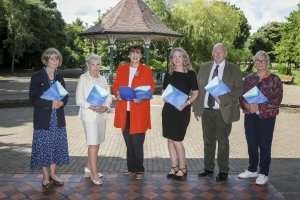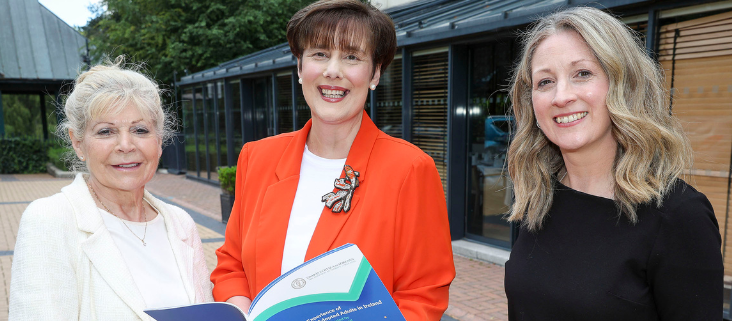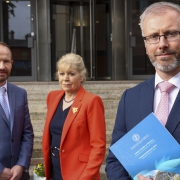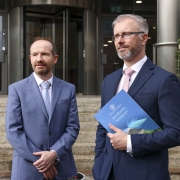Adoption Authority of Ireland Release Study on Intercountry Adopted Adults
The study focused on the lived experience of intercountry adopted adults in Ireland
The Lived Experience of Intercountry Adopted Adults in Ireland, a report on a study conducted directly by the Adoption Authority of Ireland (AAI), was launched by Minister for Children, Disability and Equality Norma Foley TD today
Over 5,000 children have been adopted into Ireland from other countries since intercountry adoption was first legislated for here in 1991. The annual figures peaked in 2008 and have been in decline ever since, reflecting a similar global pattern. The Adoption Authority wants to learn more about the lived experience of intercountry adoption, so that we can help inform the development of services and policies in this area. This study is one phase of a broader programme of research, in which we will also explore the lived experience of intercountry adopted children and teenagers.
For this first phase of the research programme, eleven intercountry adopted adults aged between 20 and 38 took part in in-depth interviews conducted directly by the AAI’s in-house research team. This yielded three key themes, bound together with the overall overarching theme that the lived experience of intercountry adoption is a continuously evolving journey. The three themes were:
- Adoptive parents set the tone in early childhood
Early lived experience of intercountry adoption was grounded in, and strongly influenced by, the decisions of parents. This included practical decisions, such as where to live, where to send the child to school and who to involve in the child’s life, and more philosophical, theoretical decisions such as how to handle the topic of adoption at home. Participants largely described happy childhoods in which they felt secure and loved. Many mentioned the benefits of their parents being open to discussions about adoption, and the supportive nature of growing up in close-knit communities.
- Adoptive identity development is an essential, but isolating task
During late childhood or early adolescence, many of the participants described experiencing a crisis of identity, in which they struggled to determine a sense of who they were as an adopted person. This was often driven by questions about their ethnicity. With few people to relate to, some wanted to know and learn more about their birth families, culture and country. Knowing and feeling that they were Irish, and grounding themselves in their Irishness was an element of central importance to several of the participants.
- The challenge of visible difference
Many participants reported experiences of racism and discrimination. These often came in the form of “microaggressions” – casual “jokes” or comments, suggesting a stigma about their ethnicity or adopted status. While these often came from strangers, they were also very likely to come from people the participants knew well – friends, members of their extended families, or other people in the adopted person’s life.
This was a small sample study, and as such, caution should be taken when generalising the findings to the rest of the intercountry adopted population. However, the findings do suggest a need for more promotion of available post-adoption support services for intercountry adopted people and their families, and for increasing the age-range at which specific therapeutic services in particular can be availed of. They also suggest a need for adoption awareness and sensitivity education among the general public, and among service providers such as teachers and healthcare professionals.
Speaking at the event Minister Foley said, “Adoption is a hugely significant matter, not just for the child, but also for their adoptive parents and families, for their families of origin, and for the broader communities involved. I welcome this important study which provides invaluable insights which will help us to understand the experience of intercountry adoption more fully and how best to support those who have been adopted into Ireland through intercountry adoption.”
The Chair of the AAI, Orlaith Traynor, highlighted the study’s significance, “Adoption is an intervention in a child’s life which has lifelong consequences. Today’s launch highlights the experiences of a small sample of intercountry-adopted people. Ireland has a responsibility to support its 5000-strong intercountry adopted population as they move through the lifespan, and I look forward to working with the Department of Children, Equality and Disability to progress the development of policies and services in this area.”
Dr. Judy Lovett, Research Officer with the AAI and author of the report said, “Thanks to the time and effort of these participants, their generosity and enthusiasm in engaging with the research process, we now know more about the lived experience of intercountry adoption in Ireland. This will help us to contribute to the global knowledge base about this under-researched area”.
The Lived Experience of Intercountry Adopted Adults in Ireland report can be downloaded HERE.
NOTE FOR THE EDITOR

Dr. Helen Buckley, board member, Orlaith Traynor, Chairperson of the Adoption Authority of Ireland, Minister for Children, Disability and Equality, Norma Foley, TD, Dr. Judy Lovett, Research Officer with the Adoption Authority of Ireland and Author of the Report, Sean O’Brien, Deputy Chair, and Sheila Green, board member
The Adoption Authority of Ireland (AAI), established on 1 November 2010 under the Adoption Act 2010, is an independent quasi-judicial body under the aegis of the Department of Children, Disability and Equality. The Authority is also, in line with The Hague Convention on the Protection of Children and Co-operation in Respect of Intercountry Adoption, the ‘Central Authority’ for intercountry adoption in Ireland.
The AAI also has functions under the Birth Information and Tracing Act 2022 (BITA). Under this legislation, all persons who were adopted, boarded out, nursed out or the subject of an illegal birth registration, or resided in a mother and baby home or county home institution as a child, can apply for access to their birth certificates and birth and early-life information. The AAI is one of two state bodies providing these services, the other being Tusla, the Child and Family Agency.
The BITA legislation also established the Contact Preference Register (CPR) held by the AAI and a robust tracing service (operated by both the AAI and Tusla), as well as a range of new bespoke measures to address issues arising for people affected by illegal birth registration.
The BITA also mandated the safeguarding of adoption records by the AAI. For information on birth information and tracing see www.birthinfo.ie.
For more information on the AAI, please visit our website at www.aai.gov.ie.







